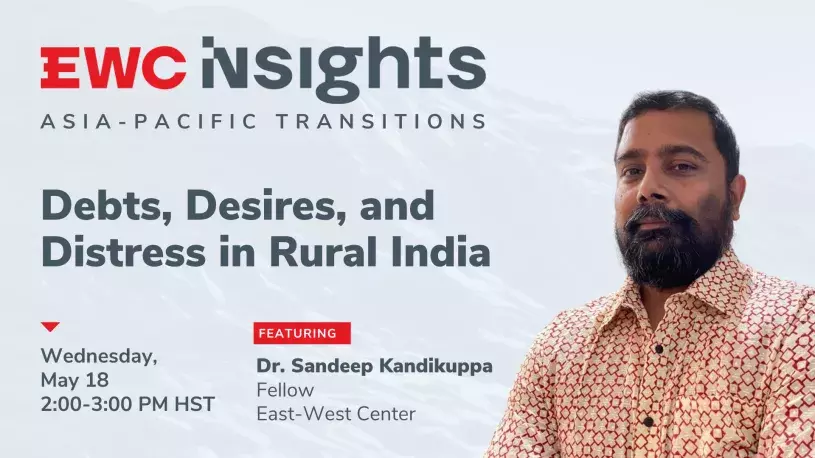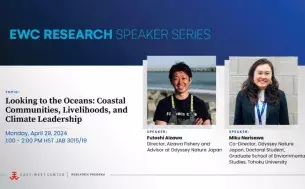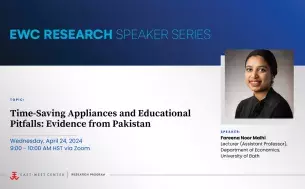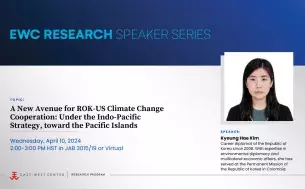Error message

EWC Insights: Asia-Pacific Transitions
Wednesday, May 18, 2022
2:00 p.m. - 3:00 p.m. HST
Live online via Zoom
DEBTS, DESIRES, AND DISTRESS
IN RURAL INDIA
featuring
Dr. Sandeep Kandikuppa
Fellow, East-West Center
Debt is omnipresent. Almost everybody borrows at some point or another. Yet, the pressure to repay exacts a higher toll—financially and mentally—on some than on others. Rural households in India have found their debt burdens to be especially onerous. Debt has pushed these households to take drastic measures like abandoning agriculture, distress migration, panic-sale of assets like cattle, and, in extreme cases, suicides. From time to time, over the decades, Indian farmers have been driven to agitate for ‘relief from debt’. In this presentation, Dr. Sandeep Kandikuppa will talk about two aspects of rural indebtedness in India. First, he will lay out the precise dimensions of indebtedness and in doing so demonstrate how it is differentiated across different classes, castes, and gender. Second, Dr. Kandikuppa will show what it is like for rural households to live with their debts. He specifically examines the practice of loan recycling. He will surface the moral economy that frames this practice and the financial landscape within which it exists. In his research, Dr. Kandikuppa relies on secondary data from large national surveys like the All-India Debt and Investment Survey, the Indian Human Development Survey, and the Modern-Era Retrospective analysis for Research and Applications, Version-2; and primary data collected through semi-structured interviews with rural households from two districts of Andhra Pradesh.
Dr. Sandeep Kandikuppa has a PhD in ecology from the University of North Carolina, Chapel Hill. In his doctoral research, he examined the causes and dimensions of the question of rural indebtedness in India. Prior to his doctoral studies, Dr. Kandikuppa worked as a practitioner for nearly ten years with some of the leading non-profits in India. His current research interests include new farmers’ movements in India, government financial inclusion programs, and human-environment interactions in the context of land and water commons in rural India.
EWC Insights: Asia-Pacific Transitions
Wednesday, May 18, 2022
2:00 p.m. - 3:00 p.m. HST
Live online via Zoom
DEBTS, DESIRES, AND DISTRESS
IN RURAL INDIA
featuring
Dr. Sandeep Kandikuppa
Fellow, East-West Center
Debt is omnipresent. Almost everybody borrows at some point or another. Yet, the pressure to repay exacts a higher toll—financially and mentally—on some than on others. Rural households in India have found their debt burdens to be especially onerous. Debt has pushed these households to take drastic measures like abandoning agriculture, distress migration, panic-sale of assets like cattle, and, in extreme cases, suicides. From time to time, over the decades, Indian farmers have been driven to agitate for ‘relief from debt’. In this presentation, Dr. Sandeep Kandikuppa will talk about two aspects of rural indebtedness in India. First, he will lay out the precise dimensions of indebtedness and in doing so demonstrate how it is differentiated across different classes, castes, and gender. Second, Dr. Kandikuppa will show what it is like for rural households to live with their debts. He specifically examines the practice of loan recycling. He will surface the moral economy that frames this practice and the financial landscape within which it exists. In his research, Dr. Kandikuppa relies on secondary data from large national surveys like the All-India Debt and Investment Survey, the Indian Human Development Survey, and the Modern-Era Retrospective analysis for Research and Applications, Version-2; and primary data collected through semi-structured interviews with rural households from two districts of Andhra Pradesh.
Dr. Sandeep Kandikuppa has a PhD in ecology from the University of North Carolina, Chapel Hill. In his doctoral research, he examined the causes and dimensions of the question of rural indebtedness in India. Prior to his doctoral studies, Dr. Kandikuppa worked as a practitioner for nearly ten years with some of the leading non-profits in India. His current research interests include new farmers’ movements in India, government financial inclusion programs, and human-environment interactions in the context of land and water commons in rural India.









